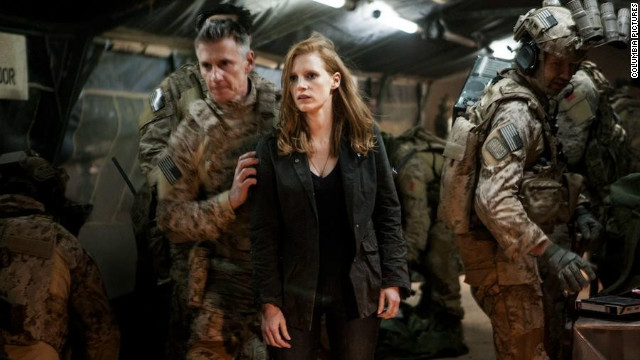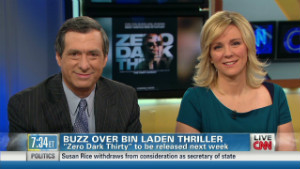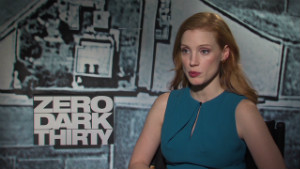
- The film follows how a CIA analyst worked for a decade tracking down Osama bin Laden
- Director Kathryn Bigelow has been accused of endorsing torture
- Jessica Chastain delivers one of the must-see performances of the year, our critic says
(CNN) -- In a place that does not exist -- a black site -- Maya (Jessica Chastain) watches as her colleague Dan (Jason Clarke) interrogates an Arab prisoner. "If you lie to me, I hurt you," Dan says to the prisoner, who is bound, bruised, and not telling the Americans what they need to know.
Soon, the prisoner will be held down on the floor with a cloth over his face and will have water poured into his mouth until he is half-drowned. This is waterboarding, and it leaves the prisoner gasping like a dying fish. But he does not give up his secrets, and will not until later in the game.
We can imagine this scene played out in different ways. Imagine it, for example, with Eastern European heavies playing the interrogators and Scarlett Johansson as the prisoner. Or we could see it with Kiefer Sutherland demanding answers in "24." Scenes of torture are not rare in TV and movies, and it's not like the old days when the hero was always on the receiving end.
Yet even before "Zero Dark Thirty" opened, these scenes have stirred controversy, with outspoken critiques accusing director Kathryn Bigelow ("The Hurt Locker") of endorsing torture. And although controversy is nothing new to the director of "Strange Days" and "Near Dark," these complaints seem off base.
 Bin Laden film sparks debate
Bin Laden film sparks debate
 Movie shines light on bin Laden sleuth
Movie shines light on bin Laden sleuth
 Kathryn Bigelow talks 'Zero Dark Thirty'
Kathryn Bigelow talks 'Zero Dark Thirty'
Bigelow has never shied away from violence or the vicarious pleasure of sadism, but that's not the same thing as condoning it. Look at how she filters the torture scenes through Maya's reactions: Maya is clearly out of place and uncomfortable with what she must witness, though she will also participate in it.
The movie -- which is utterly gripping -- is an authoritative, precise, largely dispassionate account of how a CIA analyst in Pakistan worked for a decade tracking down Osama bin Laden. That work involved torture in the years immediately following 9/11, as a matter of historical record.
Bigelow throws us in at the deep end, and rightly so. The scenes are painful to watch (but also impossible not to), and the intelligence gleaned is at best partial. Whether partial intelligence is better than none is an open question, but it's also evident in "Zero Dark Thirty" that it wasn't torture that eventually led us to bin Laden, but clear thinking, sophisticated surveillance and the determination and resources to follow every lead.
Bigelow has rarely focused on women as active protagonists ("Blue Steel" is the most notable exception), but it is significant that Maya is a woman in a predominantly masculine world, compelled to renounce her sexuality to get the job done. Maya's resolve, smarts and conviction that borders on obsessive make her a fascinating and impressive character, and Chastain delivers one of the must-see performances of the year.
Bigelow keeps the focus on process -- in a way it's like a police procedural or a detective story, but played out in foreign lands and interspersed with eruptions of violence and bomb blasts. The climax -- the SEALs raid -- is nail-biting stuff, even though we know the outcome, with exceptionally vivid nighttime photography by Greig Fraser.
What's striking is the absence of triumphalism -- Bigelow doesn't shy away from showing the victims shot down in cold blood in the compound -- and we come away with the overwhelming sense that this has been a grim, dark episode in our history, a rite of passage almost, but a passage into an unknowable future, leaving scars that may never heal.